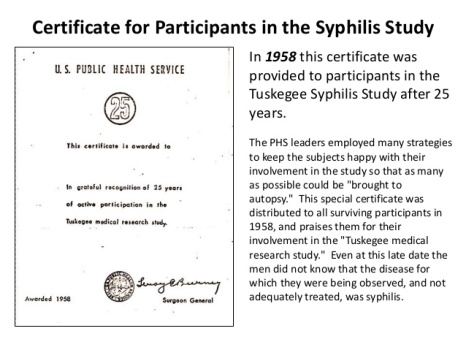
The Tuskegee Experiment is one of the most famous and long running unethical studies in the United States. There were many ethical violations during this study that spanned an entire 40 years. The main ethical violation was that lack of informed consent from the study’s participants. The Merriam-Webster dictionary defines informed consent as a formal contract that gives permission to medical professionals and researchers the consent to perform medical procedures after being made aware of all the components whether they are considered risk or benefits. The participants of the Tuskegee Experiment were not provided with informed consent. They were lied to about the true nature of the experiment, they were not informed that they had been diagnosed with syphilis, and they were lied to about the medical procedures performed on them. They were told that the experiment would only last six months and it instead lasted for 40 years. If the participants had been given the benefits of having full disclosure, it is possible that many of them would not have agreed to participate or would have ultimately left the experiment to receive appropriate treatment. Although some studies do withhold some information to control for validity and biases, it must be done while remaining ethical.

Another ethical issue present in this study was coercion. The participants were coerced to participate in this study. They were pressured to agree to the terms of this study without fully being aware of what they were agreeing to. Plied with promises of free meals, health care, and burial cost coverage, they were taken advantage of because of their race and socioeconomic status. They saw the researchers, doctors, and nurses as trusted authority figures and mostly likely believed that they could be trusted to provide adequate care.
The third major ethical issue is when researchers withheld treatment of the syphilis, even after treatments became available, for the purpose of research. The welfare of the patients was consistently neglected. They were given dangerous spinal taps that they called “spinal shots”, which could have caused even more dangers to their health. Instead of being told they were being treated for syphilis, they were told they were being treated for “bad blood” which could have included any illness from anemia to leukemia. Researchers attempted to justify the lack of treatment saying that studying the long term effects of syphilis was a good research opportunity on the participants because they were not likely to have received proper treatment anyway because they were black and poor. Even times when they had the opportunity to receive treatment, they were prevented from obtaining medication.

Fourthly, many of the primary researchers did not take accountability for the unethical treatment of the participants in the study. In fact, many of them and others in the scientific profession defended the study, even after the study was ended and drew major criticism in the media. No one was punished or suffered any real consequences for their involvement in the study even though they also broke a Alabama law passed in 1927 that required that several types of sexually transmitted diseases be reported.
Several other ethical issues in the study, including the lack of accurate reporting and records, no known confidentially maintained for the participants in the study, the dangers caused to the community due to untreated sexually transmitted diseases, exploitation and discrimination of the participants based on their race and socioeconomic status, overall negligence, and undue influence.
